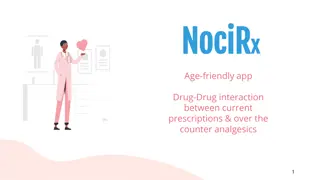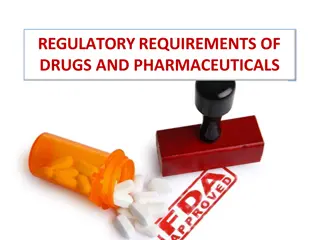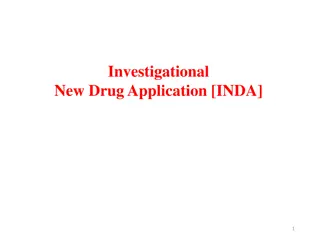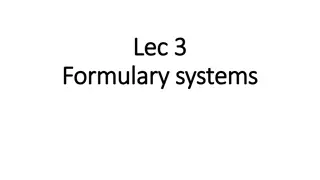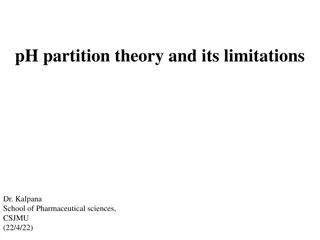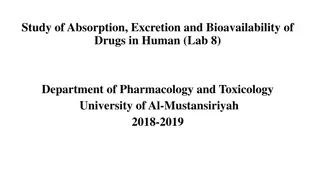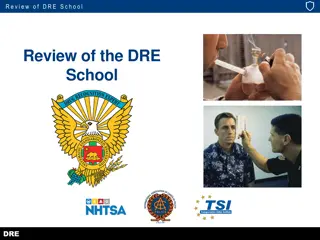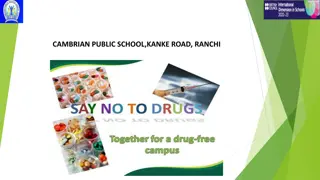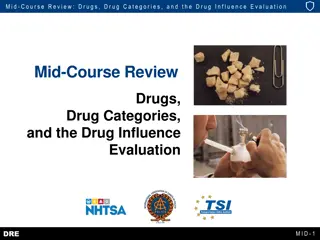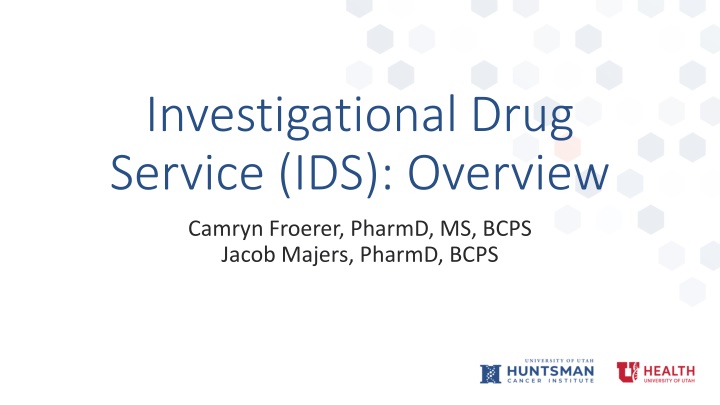
Overview of Investigational Drug Service Processes and Staff at University of Utah Health
Learn about the Investigational Drug Service (IDS) at University of Utah Health, including its processes, staff members, mission, and the types of study sponsors served. Find out about the importance of communication with IDS, pharmacy binder details, and more.
Download Presentation

Please find below an Image/Link to download the presentation.
The content on the website is provided AS IS for your information and personal use only. It may not be sold, licensed, or shared on other websites without obtaining consent from the author. If you encounter any issues during the download, it is possible that the publisher has removed the file from their server.
You are allowed to download the files provided on this website for personal or commercial use, subject to the condition that they are used lawfully. All files are the property of their respective owners.
The content on the website is provided AS IS for your information and personal use only. It may not be sold, licensed, or shared on other websites without obtaining consent from the author.
E N D
Presentation Transcript
Investigational Drug Service (IDS): Overview Camryn Froerer, PharmD, MS, BCPS Jacob Majers, PharmD, BCPS
Objectives General overview of IDS processes What a pharmacy binder looks like Best practices or tips for working with IDS Importance of notifying IDS of protocol revisions Exemption requests
IDS Staff / Hours Hours: 7 am to 5:30 pm Located at the Huntsman Cancer Hospital, Suite 2545 PharmacyTechnicians Cody Nesbit, CPhT Michelle Hillman, CPhT Brittney Scharman, CPhT Jason Worthen, CPhT Whitney Crosgrove, CPhT Austin Jett, CPhT Camille Hutchins, CPhT Alan Perez, CPhT Pharmacists Camryn Froerer, PharmD, MS, BCPS (manager) Berrie Child, PharmD, BCOP Kristie Holbrook, PharmD Jacob Majers, PharmD, BCPS Winter Redd, PharmD Michael Voight, PharmD Cameron Hill, PharmD, PhD Paymon Mirzaakbari, PharmD Ashley Hedges, PharmD, BCCPS, BCPS Rachael Freeman, PharmD, BCPS
Mission University of Utah Health We provide compassionate care without compromise. We educate scientists and health care professionals for the future. We engage in research to advance knowledge and well-being.
Study Growth IDS Open Protocol Count 700 600 500 400 300 200 100 0
Who We Serve Study patients Principle Investigators (PIs) and their study team and other MD/DOs Clinical and Translational Science Institute (CTSI) (located in Research Park and Neuro Acute Care (NAC)) Study sponsors (monitors) Other pharmacists South Jordan (satellite site) Farmington (satellite site) Sugarhouse (satellite site) Floor / clinic Nurses Infusion rooms Floor / unit-based
Types of Study Sponsors Pharmaceutical industry- sponsored (eg, GSK, Genentech, Pfizer) Cooperative groups (eg, ECOG, SWOG, Alliance, ETCTN) PI-initiated (MDs, residents, fellows, PhD) NIH-grant funded, other foundations
Purpose of IDS IDS pharmacy is responsible for the following: Receipt and storage of study medication Proper labeling and dispensing Drug accountability Proper disposal or destruction Billing for services related to investigational drugs Responsible for tasks assigned on delegation of authority (DOA) log This is a regulatory document defining role of study staff
Storage 24/7 temperature monitoring within the pharmacy using Centrak (accessed via Zulafy) Storage Capabilities Controlled room temperature (15 to 30 C) Refrigerated (2 to 8 C) -20 C Freezer (-25 to -10 C) -80 C Freezer (-80 to -70 C) Study drugs are accessible to only pharmacy staff Pharmacy door serves as 1st lock Most times, another lockable pharmacy door or lockable cabinet as 2nd lock Controlled substances (study drugs) are locked in a drug safe (CSM)
Temperature requirements Room temp: Controlled room temperature (15 to 30 C) Many studies require their drugs to be between 15 and 25 degrees Refrigerated (2 to 8 C) Frozen -20 C Freezer (-25 to -10 C) -80 C Freezer (-80 to -70 C) (usually for viral or gene tx) We do not monitor the temperature of compounded drug being transported to patient on campus as it is a short walk of transport to those areas If you would like to store medication outside our pharmacy (ie in an office) until a patient arrives you will need to a thermometer with a min and max temperature settings and log to keep track of daily temp readings for the time IP is stored.
Dispensing Takes about 2x times longer to dispense Prescriptions for study medication must have the following: Standard information Study protocol name or number Indication of signed consent Signature of investigator or co-investigator(s) Neon pink Investigational Drug label or print Investigational Drug on the top of the EPIC label on ALL study medications Handle with caution USP <800> implementation
Accountability Vestigo - electronic drug accountability Documentation - similar to narcotics Receiving from sponsor Dispensing to patient Transfers (to different protocol, another site) Returns (from patient, to sponsor)
Accountability Monthly inventory Check drug count Check for expiring drug Not always on the product label Information sent to IDS manager All records archived indefinitely in Vestigo
Return of Investigational Meds UHOSP IDS drug return bin is located toward the north end of the main hallway on the A- level between doors A090 and A050
Labeling Investigational Meds FDA Requirements for outpatient prescriptions: Pharmacy information Patient name Prescriber Drug name with strength and dose form Instructions (including route of administration) Quantity dispensed Expiration Date of dispense Refills Federal caution statement Federal law prohibits the transfer of this drug to any person other than the patient for who it was prescribed Caution, Drug limited by Federal (United States) Law to investigational use only
Labeling Investigational Meds Requirements for inpatient/clinic administered medication: Drug name with strength and dose form Expiration date We include more information than required by law like patient name for increased safety. We also prefer to utilize Epic for drug administration of all inpatient/clinic administered medication to increase safety and simplify accountability. Barcode scanning can prevent inadvertent administration errors.
Billing Patients do not get billed for investigational drugs IDS determines the costs associated with each study and bills the clinical trials office or PI Investigators/sponsor are billed for pharmacy-related expenses Cost estimates prepared ahead of study opening
Electronic Study Binders - Vestigo Short instructions Training competencies Master Subject List Company correspondences Accountability Logs Patient-specific information (consent, Rx, randomization) Shipping/receiving information
Working with IDS - Tips For general requests email Investigational.Pharmacy@hci.utah.edu A coordinating pharmacy technician monitors our shared inbox and will forward requests to the appropriate audience if you are unsure who a request needs to be sent to
Working with IDS - Tips Scheduling: SIVs: SIV Central Scheduler (qualtrics.com)) Minimum 2-weeks notice Monitor visits: Appointments - Auditing and Monitoring | Pharmacy Services | University of Utah Health Minimum 4 weeks notice
Working with IDS Tips (Patient Appointments) We need the following information: Send a New Meeting appointment to Investigational Drug Services Pharmacy through Outlook Subject Line: * Study * IRB Number * Subject Number * Subject Initials At least 1-2 weeks before the appointment * Visit Number (Week, Cycle) Location if being Delivered Date and Time of Appointment investigational.pharmacy@hci.utah.edu
Notifying IDS of protocol revisions It is important IDS is notified of protocol revisions as you become aware of them If you are unsure who to send them to please send to our main inbox and it will be sent to the assigned lead pharmacist The pharmacist will make any amendments in Vestigo and provide competency training for our team
Including the lead IDS pharmacist in protocol trainings Please include IDS in any protocol trainings or training emails. IDS should attend Site Initiation Visits when possible. It is much easier to have our team ready for study enrollment when we are included. Thanks to Robyn Barrus for keeping us up to date with protocols.
Exemption requests SOP available here: OP-IDS-Exemption-Request.pdf (utah.edu)
Exemption requests 1. IRB number 7. Description of area, facilities, and procedures to be followed for the following: a) Storage - description of the secure area where investigational drug will be stored along with the individuals and their role within the study who will have access to the secure area b) Temperature monitoring c) Accountability of investigational drug process d) Investigational drug label (for outpatient / home use) must meet federal and Utah law requirements 2. Protocol name 3. Name of the PI 4. The most recent version of the full study protocol 5. The pharmacy manual (if one is mentioned in the protocol) 6. The investigator s brochure or a statement that commercial drug is being used and the package insert for the commercial drug should be referenced for storage and handling information 8. The name of the individual who should be contacted if there are additional questions regarding the exemption request
Exemption requests Exclusions from IDS exemption (list is not all inclusive) 1. Sterile compounding requirement 2. Extemporaneous compounding (eg, fluid added to a powder to create a suspension, over encapsulation required, creation of placebo) 3. Long-term storage in temperature less than -80C (eg, storage beyond a nitrogen shipper) 4. Other circumstances that may affect the integrity of the study / research as determined and explained by the IDS pharmacy personnel 5. Inability to appropriately provide the necessary items above in section B.

